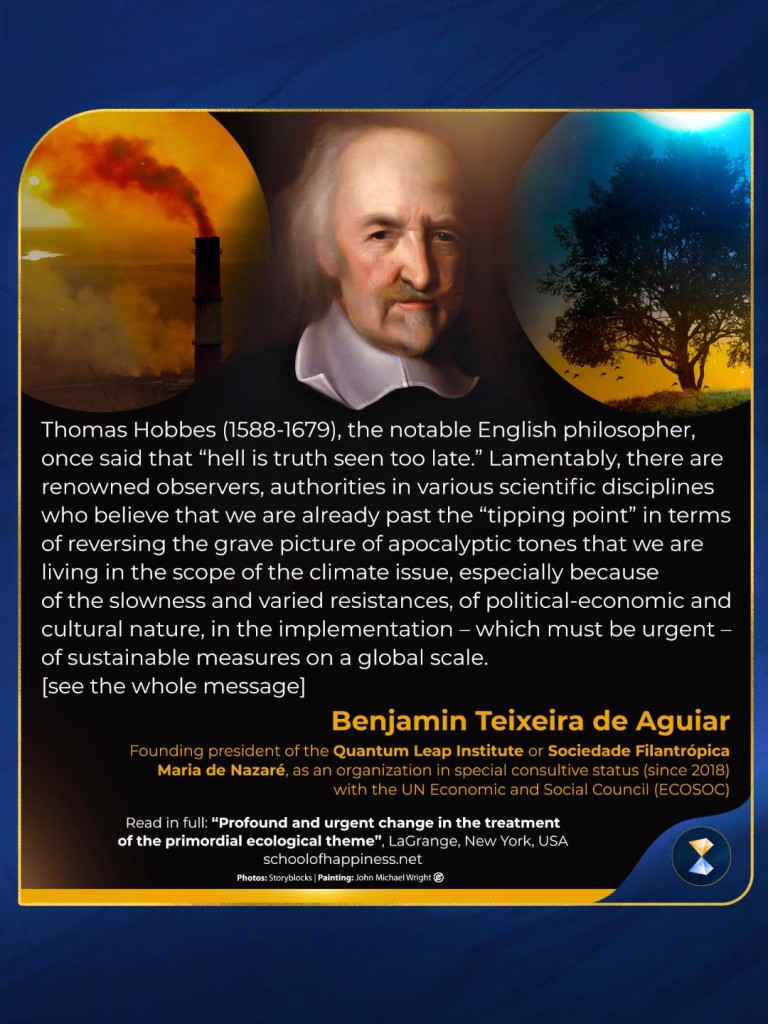Building back better from the coronavirus disease (COVID-19) while advancing the full implementation of the 2030 Agenda for Sustainable Development. (1)
Thomas Hobbes (1588-1679), the notable English philosopher, once said that “hell is truth seen too late.”
Lamentably, there are renowned observers, authorities in various scientific disciplines who believe that we are already past the tipping point in terms of reversing the grave picture of apocalyptic tones, in the climate crisis that we are living, especially because of the slowness and varied resistances, of political and cultural nature, in the implementation — which must be urgent and broad — of sustainable political-economic measures on a global scale.
The humanity-ocean relationship alone is, per se, a gigantic problem, even though 80% of the oxygen we consume comes from the oceans’ vast and invaluable natural resources.
If we consider, then, the terrestrial face of the ecosystems, the difficulties are massive when evaluating the probability of us achieving an implementation of important changes to the eco-conscious use of its renewable or non-renewable resources, changes that effectively have an impact on the short and, especially, on the medium and long terms, with the aim to make viable the human presence on the surface of the planet.
It is essential to invest all possible resources and make every effort we can in the education and enlightenment of the younger generations, regardless of gender, about the kaleidoscopic complexity of the subject, and even in the re-education of the older ones, who are the current decision makers, toward a conscientious management and an indispensable readiness to a profound change of paradigms used to deal with the essential ecological theme, inextricably intertwined with the etiology of the current and future — inevitable, according to experts — pandemics.
No serious, broad and lasting initiative will succeed, on a planetary scale, while there are disparities or even, in certain sectors, subtle misalignments, between governmental actions, be they of poor, developing, or rich nations.
And to overcome this geopolitical cacophony, it is indispensable to meet the pressing needs regarding fundamental matters of basic infrastructure of education of both genders, including the pillars of food, sanitation and medical-hospital coverage for countries less equipped to adjust to the international demands for the survival of the human civilization in the unprecedented crisis with potential for self-extinction that we are going through.
Despite what we have said above — and perhaps precisely because of the acuteness and breadth of the problem — we must never abandon hope, optimism, and above all, the channeling of these principles into the actions of individuals and communities, in a courageous and persevering way, until we achieve the minimum results that guarantee the perpetuation of our species on the Earth’s crust.
Benjamin Teixeira de Aguiar 2
LaGrange, New York, USA
April 22, 2022
(1) Theme of the HLPF (High-Level Political Forum) 2022
(2) President of Sociedade Filantrópica Maria de Nazare, an organization in special consultative status with the Economic and Social Council (ECOSOC) since 2018
See the Portuguese version: Mudança profunda e urgente no trato da primordial temática ecológica – Documento de participação do ISQ no HLPF 2022 da ONU

